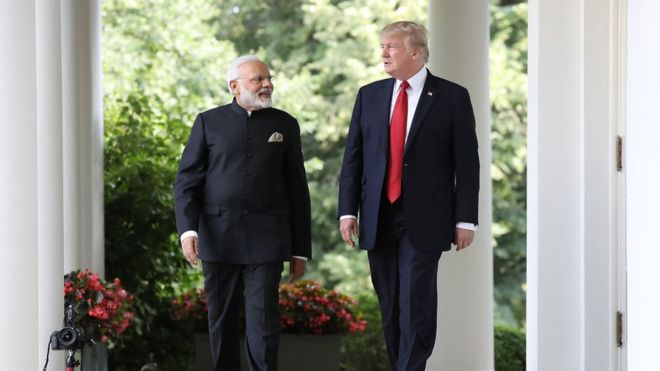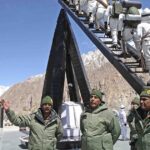
SOURCE: BBC
Indian-American voters are being courted by both the Republicans and the Democrats this election cycle. The community has historically leaned Democrat – but has US President Donald Trump helped make inroads for the GOP?
On a lazy Saturday morning in August, Florida businessman Danny Gaekwad was barely awake when his phone lit up. The Trump campaign had launched an ad overnight, and the WhatsApp groups on his phone were buzzing non-stop.
The viral video, featuring President Trump and Indian Prime Minister Narendra Modi, walking hand-in-hand and lathering praise on each other at a massive event held in Houston last year, had already attracted more than a million views on social media platforms, and the nearly 2,000 Indian-Americans on his chat groups were sharing it at a furious pace.
Mr Gaekwad, a top hotelier and real estate developer with strong ties to the Florida Republican establishment, says the excitement was unprecedented.
“Trump is a God-sent opportunity for Indian-Americans if they want to have a say in this country,” says Mr Gaekwad, who believes this kind of outreach will make a difference in the outcome of the 3 November elections.
While Democrats do not have the bonhomie of Mr Trump and Mr Modi to boast of, they have Senator Kamala Harris as Democratic challenger Joe Biden’s running mate – and there’s ample evidence to suggest her presence has galvanised the party’s Indian-American supporters.
Ms Harris identifies as black, given her father is a Jamaican-American, but on the campaign trail she often speaks about her late mother Shyamala Gopalan, a biomedical scientist who immigrated to the United States from India as a young woman.
Until recently, many Indian-Americans had assumed Ms Harris to be a black politician, but the way she talks about her mother and embraces her Indian roots seems to have endeared her to many in the community.
Ramesh Kapur, a Massachusetts-based Indian-American industrialist, says the impact of the senator’s Indian-American roots is most visible at fundraisers.
At a virtual event for Mr Biden the last week of September, the community raised $3.3m (£2.5m) in one night – the target was $1.5m. “It was a record for any single-night fundraiser and even Biden acknowledged it was because of her,” says Mr Kapur, who has organised fundraisers for Democrats since Michael Dukakis ran for the White House in 1988.
There’s no precise data on the number of Indian-American voters but, based on estimates from various political groups, it lies somewhere between 1.6 to 2 million.
A large number resides in states where the election results are a given, but they do have a significant presence in places like Michigan and Pennsylvania, where the races were tight and decided with a narrow margin in 2016.
As a result, both parties are aggressively courting this voting demographic.
“We are no longer just the ATMs. Our votes will count,” says Mr Gaekwad, who has a personal goal of boosting the Republican Indian-American vote by at least 10% in Florida, another battleground state.
Republicans have tried to make inroads into the Indian-American community for years, but it was only in 2016 that they had some success. Mr Trump was perceived as taking a strong stand against “radical Islamic terror”, an issue that resonates with many Hindu Indian-Americans.
Many in the community also believe he strongly supports Mr Modi’s stand on the issue of Kashmir, an area claimed both by India and Pakistan.
Mr Kapur says Democrats will always voice their concern when it comes to the abuse of civil rights and human rights. Mr Biden and Ms Harris have voiced concern about India’s handling of Kashmir, which wasn’t well-received in the Indian-American community.
But to say that Mr Trump will be better for India than Mr Biden is simply not true, says Mr Kapur.
“Democrats know that Kashmir is as important to Indian-Americans as Jerusalem is to Jewish-Americans,” he says.
He adds that “during the primaries, candidates were fed just one side of the story”, suggesting Democratic candidates like Ms Harris may have been influenced by US pressure groups.
Meanwhile, for Mr Trump, mega-PR events like ‘Howdy Modi!’ and ‘Namaste Trump’ with the Indian prime minister – massive rallies held in each leaders’ respective countries – have helped too.
In fact, the day after President Trump tested positive for coronavirus, a group of Hindu Indian-Americans in Chicago conducted a havan, an elaborate Hindu prayer ritual, for the “speedy recovery of the President and First Lady Melania”.
The hope is events like these will indirectly add to the energy for Mr Trump among Indian-Americans, who are known to lean Democrat by a huge margin.
According to the 2020 Asian American Voter Survey, 65% are inclined to vote for Joe Biden while 28% favour Trump.
The challenge for Democrats, however, is to translate this support into actual voter turnout, something for which the community has displayed a low propensity in the past.
Shekar Narasimhan, founder of the AAPI Victory Fund, a political group that helps elect Asian-Americans, is optimistic.
He says they have registered a record number of young volunteers who are phone-banking across the country in every major Indian language.
Also, a number of Indians who were on a green card – which give immigrants legal permanent residence and the opportunity to apply for American citizenship – or a permanent residence visa for years, acquired US citizenship in 2018 when they felt President Trump was likely to impose further restrictions on naturalisation.
Mr Narasimhan estimates roughly a million Indian-American voters are in the battleground states and their turnout could be a game changer.
“I have no doubt they are awake,” he says.






